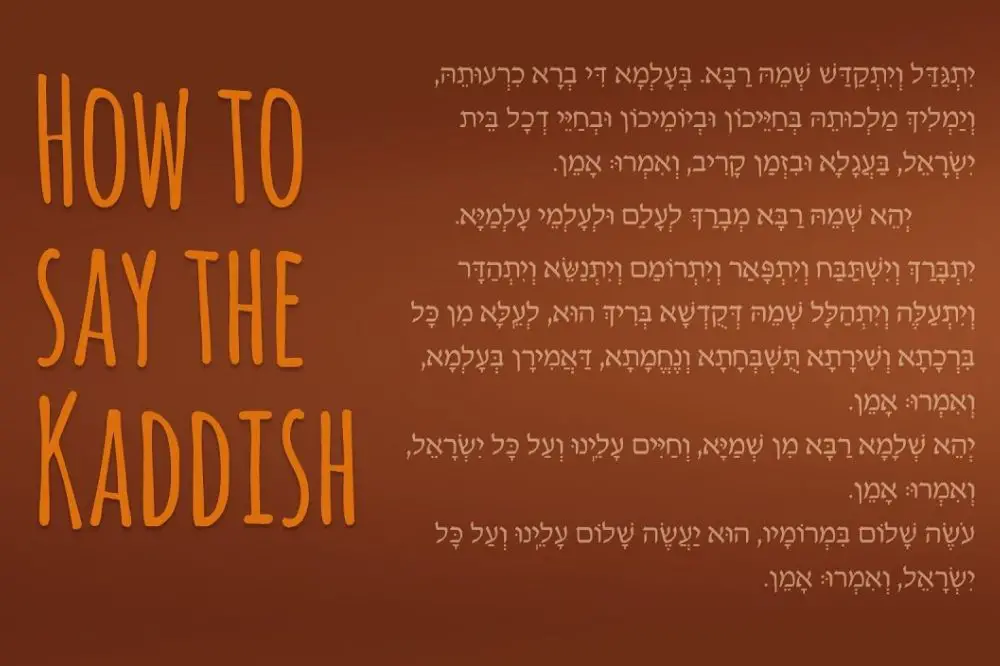There’s a surprising history behind one of Judaism’s most famous and most powerful prayers.
What is Kaddish Yatom Prayer ? The Kaddish Yatom (kaddish orphan) is thought to have originated in temple times. It was recited after a rabbinic lecture, a way to remember that all those specifics of Jewish law were part of a much bigger picture.
Many scholars think, that the lecturer would end his talk by freestyling some words of praise in Aramaic, the language of the day. According to this theory, the Kaddish was the result of one such freestyling, integrating language from the books of Ezekiel, Daniel, Job and Psalms.
Eventually, these particular words stuck and became standard. The Kaddish didn’t become associated with death and mourning until the seventh century. Probably what happened was this: if a scholar died someone would teach some of his wisdom at the funeral, maybe as part of the eulogy.
Since Torah was being taught then they’d say the Kaddish afterwards. But, it wasn’t long before some people began to get offended. “Wait, you said Kaddish at that guy’s funeral but not our beloved deceased? What are you trying to say that our beloved deceased wasn’t a great scholar?”.
Who Says Kaddish?
So, it began to become standard to teach Torah at everybody’s funeral. Then eventually saying Kaddish itself became part of the standard morning practice. As rabbi Lam put it: “The Kaddish serves as an epilogue to human life just as historically it served as an epilogue to Torah study.”
It’s a way for mourners to get into a space of praise, even in their grief. It’s a way to honor the life of the deceased to sanctify God’s name as part of affirming their relative’s legacy, and we need a quorum of Jews in order to say Kaddish, because when we’re mourning we should be in community.
Eventually, the Kaddish moved its way into every prayer service. Serving is something of a punctuation mark that demarcates different sections of the liturgy. The words of the Kaddish don’t actually talk about study at all, rather their praises to God and hopes for divine sovereignty and peace and not just praises but heaps and piles of praises.
Standing Up and Say Amen in Kaddish
Blessed and praised glorified and exalted extolled and honored adored and lauded, may be the name of the Holy One blessed be God It’s a lot. It’s meant to be a lot, it’s meant to overwhelm you. It’s about taking you to this place of glory, and exaltation and not holding back at all, let it all out.
But, the real power of the prayer was thought to be in the congregational response to the first paragraph. Our response matters, were not meant to stand passively on the sidelines of all of this praise, but to enter into the space of profound awe and glory ourselves and to that let us say Amen.
Saying Kaddish Without a Minyan
When there is no minyan to say Kaddish- there is still something perhaps more important mourners can do — commit to living that life as fully as possible.
Mourner’s Kaddish in Aramaic Transliteration
Seeking Guidance When Saying Kaddish
If you are seeking guidance with the saying of Kaddish, then I assume you’re in pain. The loss of someone you love, someone central to your life, touches and impacts you in a way that you have never experienced before.
I only hope that in some small way, this attempt to guide you through the saying of Kaddish, helps you in the process of mourning, finding comfort and even finding meaning in this most difficult hour in your life.
Before beginning the Kaddish, I want to share with you a sense of what you are doing when saying Kaddish, and what you are achieving when you say Kaddish. After that, I will tell you about the meaning of the opening lines of the Kaddish, and then we I will write down the Kaddish prayer.
What You Achieve When You Say Kaddish?
Each of us is a synthesis of a body and a soul, we are both physical and spiritual beings. The body is our outer world, and a more superficial reality. The soul is our inner world, the soul is the essence of who we are.
As children, we are each an extension of our parents, both physically and spiritually, the body and our souls. It’s critical that you understand the following. Kaddish is not a prayer for someone who has passed away, Kaddish is not a prayer for the dead, Kaddish is a prayer for the living that can achieve spiritual benefit for someone who has passed away.
Judaism understands that the world we live in, the physical world is part of a much bigger reality. After death when the soul leaves the body, it enters another realm. The world of pure spirituality, a world where the soul lives in the clear pristine presence of God.
In the next world, the spiritual world, the soul’s ability to perceive and connect to God, is determined by how that person lived in this world, while he, or she was a body and a soul. Once a soul is in the next world, it can no longer achieve rather it can only be. However, you as a living extension of someone in the next world, can contribute to the quality of the soul’s experience of God in the next world.
As someone who will say Kaddish, you are standing in a very lonely place. At the same time, despite your pain and the loneliness in the anguish, you are standing in the midst of the Jewish community. You are not alone.
With Kaddish you are saying, that despite the pain, despite how lost and shaken you feel nonetheless, you will acknowledge that there is a deeper underlying reality, and a meaning to life.
We may not understand all that happens, but as Jews, we always acknowledge that God is an ever-present reality, and that this transcendent reality is ever-present, even in the darkest moments.
Meaning of Opening Lines of The Kaddish

Let’s look at the first lines of the Kaddish prayer.
“May his great name be exalted and sanctified in the world that he created”. You see, when one stands and says Kaddish, when one is feeling that pain, that deep sense of lost and even of being lost personally. Nonetheless, we contribute to the ultimate purpose of what Jewish life and the Jewish people are all about, which is to stand in testimony of the reality of the presence of God in all things and at all times, even the difficult times. That’s what we mean that’s what you will mean when you say the first Kaddish line.
We as Jews, always understand, and always look at everything that takes place in life, as an extension of God’s will. We may not understand it, it may be very difficult but we say and we know and when we say the Kaddish we testify that there’s a bigger picture, a bigger reality.


